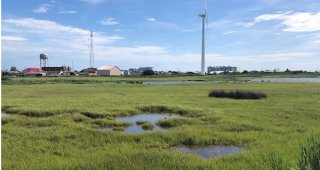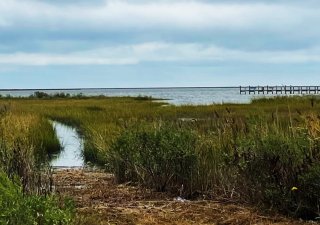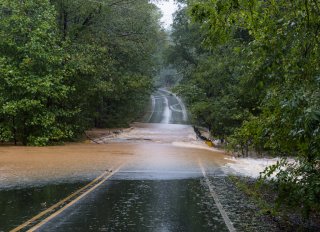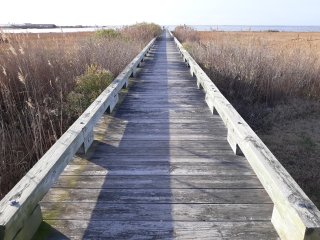Coastal Community Resilience Research Project Updates

On this page:
Assessing Nature-Based Strategies

EPA is supporting community decision making around the trade-offs of different nature-based strategies to ensure that they align with the values and desired future of the community. This work includes investigating natural infrastructure strategies like saltmarsh restoration, artificial reefs, and living breakwaters to build coastal resilience in and around Crisfield. These strategies may also have co-benefits for the community’s culture, history, seafood industry, tourism, and recreation.
Publications
- A Summary of Adaptation Pathways Approaches
- Climate-Smart Design Assessment Based on Vulnerabilities of Selected Nature-Based Solutions under Consideration for Crisfield, Maryland
- Nature Based Strategies for Coastal Resilience in Crisfield, Maryland: Literature Review and Initial Scoping
- Supporting Coastal Community Resilience through Natural Infrastructure (Crisfield, MD): Stakeholder Meetings
- Nature Based Strategies for Coastal Resilience: Potential Implementation in Crisfield, Maryland (pdf)
Environmental Leadership and Education

EPA offered educational training and environmental leadership opportunities for members of the Crisfield community and surrounding areas. These involved conversations with expert scientists and opportunities to gain practical knowledge of local environmental challenges, policies, and programs.
Crisfield Resilience Academy
As part of its efforts to deal with current environmental challenges such as flooding, Crisfield is partnering with EPA and others to explore coastal resilience solutions with an education training opportunity called the Crisfield Resilience Academy.
Learn more about the Crisfield Resilience Academy.
Public Learning Sessions
The EPA, in partnership with BEACON at Salisbury University and Tetra Tech, hosted local public learning sessions in 2024 on environmental and coastal resilience topics.
Research Co-Production

Research co-production is an approach in which researchers, stakeholders, and public participants work together in a partnership to identify areas of concerns and information gaps, share scientific and local knowledge, and plan research efforts. The goals of this research process are to:
- co-develop research with the Crisfield community and surrounding area to address their needs and goals;
- keep the community and key stakeholders updated with research designs and results; and
- develop products such as presentations, reports, and tools that are useful and accessible for the community and other stakeholders.
This co-production approach involves regular check-ins with key stakeholders, data collection for use in report development and decision-making, meetings and workshops to collect input and feedback on research plans and products, and updates for the community members.
Technical Working Group
The Technical Working Group is designed to provide interim feedback on EPA’s data collection, analysis and modeling of nature-based solutions and social and economic co-benefits. The group includes subject matter experts to provide review and input on the nature-based solutions research to improve Crisfield’s coastal resilience. Members are experienced in salt marsh ecosystems, coastal engineering, and related fields with knowledge of the Crisfield area. The group meets quarterly during 2024 and 2025.
| Meeting Date | Documents |
|---|---|
| August 26, 2025 | |
| July 30, 2025 | |
| June 12, 2025 | |
| May 20, 2025 | |
| April 1, 2025 | |
| December 6, 2024 | |
| October 2, 2024 | |
| July 31, 2024 |
Public Input Sessions
Public input sessions are held to inform the Crisfield community about EPA’s research and to solicit input from the public to be considered in the EPA’s research efforts.
As public sessions are scheduled, additional information will be added to this webpage.
| Meeting Date | Documents |
|---|---|
| September 11, 2025 | Crisfield Nature-Based Strategies Research: Community Workshop #4 |
| July 10, 2025 | Crisfield Nature-Based Strategies Research: Community Workshop #3 |
| November 23, 2024 | Supporting Coastal Community Resilience Through Natural Infrastructure (pdf) |
| April 20, 2024 | Crisfield Natural Spaces Discussions: April 20, 2024 (pdf) |
Partner Meetings
| Date | Documents |
|---|---|
| August 27, 2025 | Crisfield Nature-Based Strategies Research: Final Top 6 Projects (Presented to Crisfield Mayor) |
| July 9, 2025 | Supporting Coastal Community Resilience through Natural Infrastructure: Update for Crisfield City Council (Presented at Crisfield City Council Meeting) |
| October 30, 2024 | Crisfield, MD Nature-Based Strategies for Coastal Resilience (Presented at the Maryland Department of Environmental Joint Evaluation Meeting |
| October 16, 2024 | Nature-Based Strategies for Crisfield Coastal Resilience (Presented at the Chesapeake Bay Tidal Wetlands Restoration's Pocomoke Sound Meeting) |
| September 26, 2024 | Supporting Coastal Community Resilience through Natural Infrastructure (Presented at Crisfield's Standing Coordination Call) |
| April 19, 2024 | Supporting Coastal Community Resilience through Natural Infrastructure (Presented at the Crisfield Institutional Stakeholder Meeting) |
Learn More About the Science
- Adaptation Organon Process in the Coastal Resilience Solutions-Driven Research Project
- What is a Living Shoreline? (NOAA)
- Living Shorelines (Maryland Department of Natural Resources)
